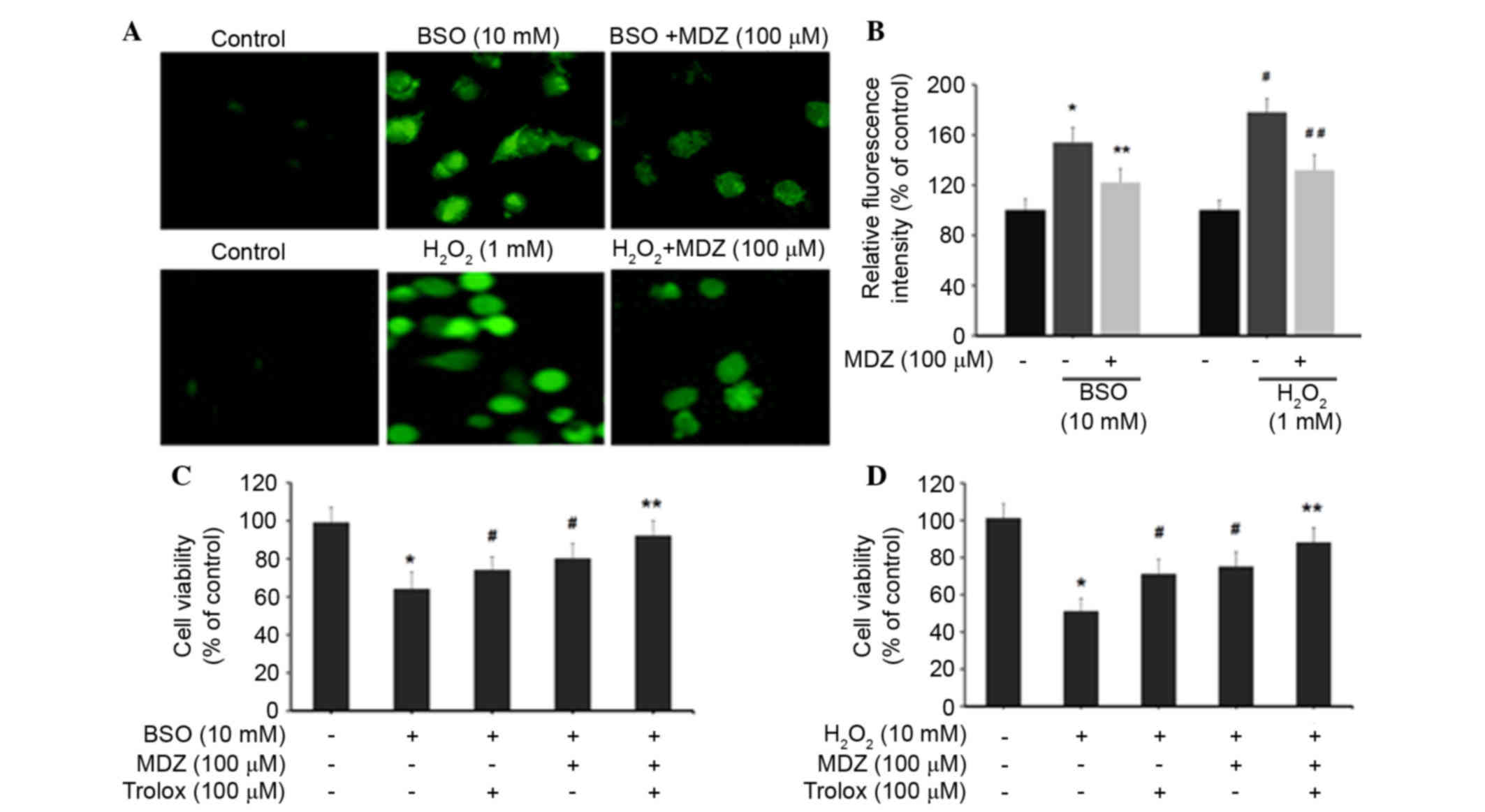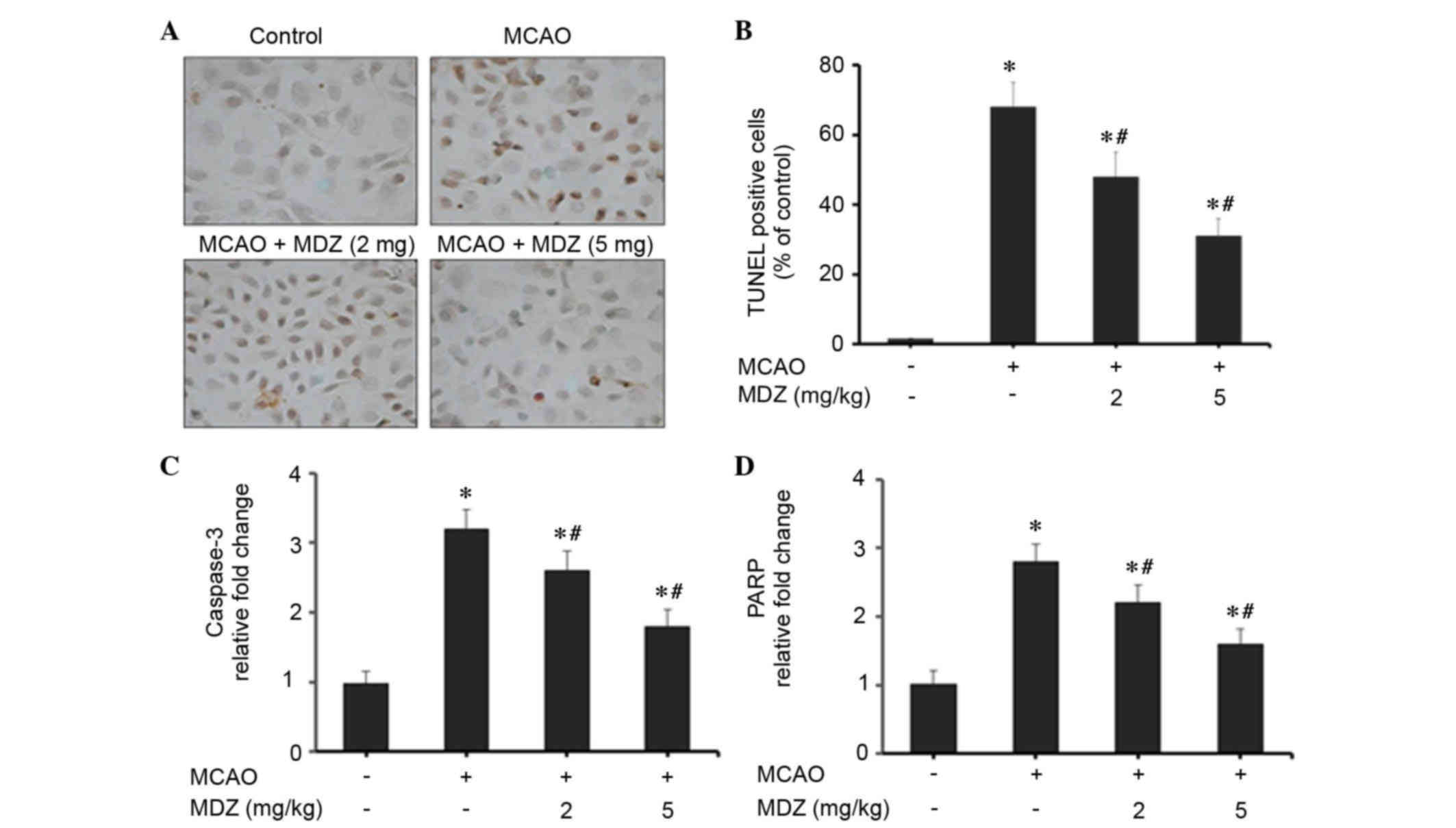|
1
|
So EC, Chang YT, Hsing CH, Poon PW, Leu SF
and Huang BM: The effect of midazolam on mouse Leydig cell
steroidogenesis and apoptosis. Toxicol Lett. 192:169–178. 2010.
View Article : Google Scholar : PubMed/NCBI
|
|
2
|
Jevtovic-Todorovic V, Hartman RE, Izumi Y,
Benshoff ND, Dikranian K, Zorumski CF, Olney JW and Wozniak DF:
Early exposure to common anesthetic agents causes widespread
neurodegeneration in the developing rat brain and persistent
learning deficits. J Neurosci. 23:876–882. 2003.PubMed/NCBI
|
|
3
|
Head BP, Patel HH, Niesman IR, Drummond
JC, Roth DM and Patel PM: Inhibition of p75 neurotrophin receptor
attenuates isoflurane-mediated neuronal apoptosis in the neonatal
central nervous system. Anesthesiology. 110:813–825. 2009.
View Article : Google Scholar : PubMed/NCBI
|
|
4
|
Vutskits L, Gascon E, Tassonyi E and Kiss
JZ: Clinically relevant concentrations of propofol but not
midazolam alter in vitro dendritic development of isolated
gamma-aminobutyric acid-positive interneurons. Anesthesiology.
102:970–976. 2005. View Article : Google Scholar : PubMed/NCBI
|
|
5
|
Stratmann G, Sall JW, May LD, Bell JS,
Magnusson KR, Rau V, Visrodia KH, Alvi RS, Ku B, Lee MT and Dai R:
Isoflurane differentially affects neurogenesis and long-term
neurocognitive function in 60-day-old and 7-day-old rats.
Anesthesiology. 110:834–848. 2009. View Article : Google Scholar : PubMed/NCBI
|
|
6
|
Walker SM, Westin BD, Deumens R, Grafe M
and Yaksh TL: Effects of intrathecal ketamine in the neonatal rat:
Evaluation of apoptosis and long-term functional outcome.
Anesthesiology. 113:147–159. 2010. View Article : Google Scholar : PubMed/NCBI
|
|
7
|
Briner A, De Roo M, Dayer A, Muller D,
Habre W and Vutskits L: Volatile anesthetics rapidly increase
dendritic spine density in the rat medial prefrontal cortex during
synaptogenesis. Anesthesiology. 112:546–556. 2010. View Article : Google Scholar : PubMed/NCBI
|
|
8
|
De Roo M, Klauser P, Briner A, Nikonenko
I, Mendez P, Dayer A, Kiss JZ, Muller D and Vutskits L: Anesthetics
rapidly promote synaptogenesis during a critical period of brain
development. PLoS One. 4:e70432009. View Article : Google Scholar : PubMed/NCBI
|
|
9
|
Yahalom B, Athiraman U, Soriano SG,
Zurakowski D, Carpino EA, Corfas G and Berde CB: Spinal anesthesia
in infant rats: Development of a model and assessment of neurologic
outcomes. Anesthesiology. 114:1325–1335. 2011. View Article : Google Scholar : PubMed/NCBI
|
|
10
|
Scallet AC, Schmued LC, Slikker W Jr,
Grunberg N, Faustino PJ, Davis H, Lester D, Pine PS, Sistare F and
Hanig JP: Developmental neurotoxicity of ketamine: Morphometric
confirmation, exposure parameters, and multiple fluorescent
labeling of apoptotic neurons. Toxicol Sci. 81:364–370. 2004.
View Article : Google Scholar : PubMed/NCBI
|
|
11
|
Abdel-Wahab AF and Al-Harizy WM: Propofol
protects against ischemia/reperfusion injury associated with
reduced apoptosis in rat liver. ISRN Anesthesiology 2013. Article
ID 517478. 82013.
|
|
12
|
Arai Y, Kondo T, Tanabe K, Zhao QL, Li FJ,
Ogawa R, Li M and Kasuya M: Enhancement of hyperthermia-induced
apoptosis by local anesthetics on human histiocytic lymphoma U937
cells. J Biol Chem. 277:18986–18993. 2002. View Article : Google Scholar : PubMed/NCBI
|
|
13
|
Mishra SK, Kang JH, Lee CW, Oh SH, Ryu JS,
Bae YS and Kim HM: Midazolam induces cellular apoptosis in human
cancer cells and inhibits tumor growth in xenograft mice. Mol
Cells. 36:219–226. 2013. View Article : Google Scholar : PubMed/NCBI
|
|
14
|
Young C, Jevtovic-Todorovic V, Qin YQ,
Tenkova T, Wang H, Labruyere J and Olney JW: Potential of ketamine
and midazolam, individually or in combination, to induce apoptotic
neurodegeneration in the infant mouse brain. Br J Pharmacol.
146:189–197. 2005.PubMed/NCBI
|
|
15
|
Stevens MF, Werdehausen R, Gaza N,
Hermanns H, Kremer D, Bauer I, Küry P, Hollmann MW and Braun S:
Midazolam activates the intrinsic pathway of apoptosis independent
of benzodiazepine and death receptor signaling. Reg Anesth Pain
Med. 36:343–349. 2011. View Article : Google Scholar : PubMed/NCBI
|
|
16
|
Casellas P, Galiegue S and Basile AS:
Peripheral benzodiazepine receptors and mitochondrial function.
Neurochem Int. 40:475–486. 2002. View Article : Google Scholar : PubMed/NCBI
|
|
17
|
Chiang T, Messing RO and Chou WH: Mouse
model of middle cerebral artery occlusion. J Vis Exp.
pii:27612011.
|
|
18
|
Longa EZ, Weinstein PR, Carlson S and
Cummins R: Reversible middle cerebral artery occlusion without
craniectomy in rats. Stroke. 20:84–91. 1989. View Article : Google Scholar : PubMed/NCBI
|
|
19
|
Livak KJ and Schmittgen TD: Analysis of
relative gene expression data using real-time quantitative PCR and
the 2(−Delta Delta C(T)) method. Methods. 25:402–408. 2001.
View Article : Google Scholar : PubMed/NCBI
|
|
20
|
Young C and Olney JW: Neuroapoptosis in
the infant mouse brain triggered by a transient small increase in
blood alcohol concentration. Neurobiol Dis. 22:548–554. 2006.
View Article : Google Scholar : PubMed/NCBI
|
|
21
|
Wüllner U, Seyfried J, Groscurth P,
Beinroth S, Winter S, Gleichmann M, Heneka M, Löschmann P, Schulz
JB, Weller M and Klockgether T: Glutathione depletion and neuronal
cell death: The role of reactive oxygen intermediates and
mitochondrial function. Brain Res. 826:53–62. 1999. View Article : Google Scholar : PubMed/NCBI
|
|
22
|
Valencia A and Morán J: Reactive oxygen
species induce different cell death mechanisms in cultured neurons.
Free Radic Biol Med. 36:1112–1125. 2004. View Article : Google Scholar : PubMed/NCBI
|
|
23
|
Griffiths JD, Le NV, Grant S, Bjorksten A,
Hebbard P and Royse C: Symptomatic local anaesthetic toxicity and
plasma ropivacaine concentrations after transversus abdominis plane
block for Caesarean section. Br J Anaesth. 110:996–1000. 2013.
View Article : Google Scholar : PubMed/NCBI
|
|
24
|
Sakura S, Kirihara Y, Muguruma T,
Kishimoto T and Saito Y: The comparative neurotoxicity of
intrathecal lidocaine and bupivacaine in rats. Anesth Analg.
101:541–547. 2005. View Article : Google Scholar : PubMed/NCBI
|
|
25
|
Zhang DX, Ding HZ, Jiang S, Zeng YM and
Tang QF: An in vitro study of the neuroprotective effect of
propofol on hypoxic hippocampal slice. Brain Inj. 28:1758–1765.
2014. View Article : Google Scholar : PubMed/NCBI
|
|
26
|
Liang C, Cang J, Wang H and Xue Z:
Propofol attenuates cerebral ischemia/reperfusion injury partially
using heme oxygenase-1. J Neurosurg Anesthesiol. 25:311–316. 2013.
View Article : Google Scholar : PubMed/NCBI
|
|
27
|
Shao H, Zhang Y, Dong Y, Yu B, Xia W and
Xie Z: Chronic treatment with anesthetic propofol improves
cognitive function and attenuates caspase activation in both aged
and Alzheimer's disease transgenic mice. J Alzheimers Dis.
41:499–513. 2014.PubMed/NCBI
|
|
28
|
Shi C, Zhao L, Zhu B, Li Q, Yew DT, Yao Z
and Xu J: Protective effects of Ginkgo biloba extract (EGb761) and
its constituents quercetin and ginkgolide B against beta-amyloid
peptide-induced toxicity in SH-SY5Y cells. Chem Biol Interact.
181:115–123. 2009. View Article : Google Scholar : PubMed/NCBI
|
|
29
|
Bournival J, Quessy P and Martinoli MG:
Protective effects of resveratrol and quercetin against MPP+
-induced oxidative stress act by modulating markers of apoptotic
death in dopaminergic neurons. Cell Mol Neurobiol. 29:1169–1180.
2009. View Article : Google Scholar : PubMed/NCBI
|
|
30
|
Chong WS, Hyun CL, Park MK, Park JM, Song
HO, Park T, Lim YS, Cho CK, Kang PS and Kwon HU: Midazolam protects
B35 neuroblastoma cells through Akt-phosphorylation in reactive
oxygen species derived cellular injury. Korean J Anesthesiol.
62:166–171. 2012. View Article : Google Scholar : PubMed/NCBI
|
|
31
|
Satoh T, Nakatsuka D, Watanabe Y, Nagata
I, Kikuchi H and Namura S: Neuroprotection by MAPK/ERK kinase
inhibition with U0126 against oxidative stress in a mouse neuronal
cell line and rat primary cultured cortical neurons. Neurosci Lett.
288:163–166. 2000. View Article : Google Scholar : PubMed/NCBI
|
|
32
|
Stanciu M, Wang Y, Kentor R, Burke N,
Watkins S, Kress G, Reynolds I, Klann E, Angiolieri MR, Johnson JW
and DeFranco DB: Persistent activation of ERK contributes to
glutamate-induced oxidative toxicity in a neuronal cell line and
primary cortical neuron cultures. J Biol Chem. 275:12200–12206.
2000. View Article : Google Scholar : PubMed/NCBI
|
|
33
|
McCubrey JA, Steelman LS, Chappell WH,
Abrams SL, Wong EW, Chang F, Lehmann B, Terrian DM, Milella M,
Tafuri A, et al: Roles of the Raf/MEK/ERK pathway in cell growth,
malignant transformation and drug resistance. Biochim Biophys Acta.
1773:1263–1284. 2007. View Article : Google Scholar : PubMed/NCBI
|




















